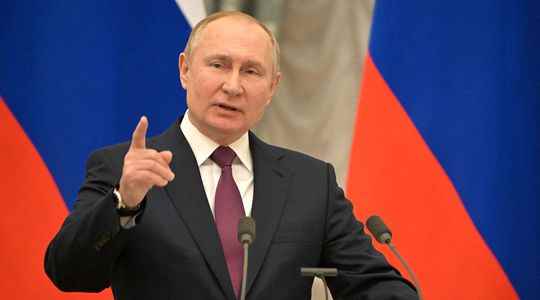“The king is the slave of history,” wrote Leo Tolstoy in War and peace (1869). Putin, he intends to be the master. At almost 70 years old, he wants to change its course to erase the humiliation of the end of the Soviet empire. This dream goes through Ukraine, as he theorized in a long article published on the Kremlin website last summer. According to him, Ukraine is not a state, not a country, but a simple “territory”, exploited by the West for three decades. “He is firmly convinced that the West seeks to weaken Russia in order to destroy it, and that it has taken Ukraine hostage for this purpose”, analyzes the founder of the think-tank R. Politik Tatiana Stanovaya.
Putin sees himself as a savior and wants to bring Ukraine back into his fold. By fair means or foul ! The first option (over the counter) seems impossible. The second (by force) is never excluded. Between the two there is a range of scenarios, including the simple continuation of the “nibbling” of Ukraine with, for example, the official recognition of the self-proclaimed republics of Lughansk and Donetsk.
Does the withdrawal of troops, sketched out at the start of the week, change the situation? Not really. “Putin thinks in historical terms and he is very constant”, assures Michel Eltchaninoff, author of Inside the mind of Vladimir Putin (Solin/Actes Sud). But the master of the Kremlin has formed two convictions. First, history has placed him in such circumstances that he now considers himself the only one capable of restoring Russia’s imperial greatness. In this sense, he is indeed “the slave of history”. Then his people can be glorious actors in this sacred mission. “He lives with this fundamental conviction that the Russian man, unlike the decadent Westerner, is the only one ready to sacrifice himself in a conflict”, resumes Michel Eltchaninoff. And that’s what makes it dangerous.
What do economic sanctions weigh against these existential considerations? Not much. The opposition? She is muzzled, like Alexei Navalny. Population ? In Russia, 85% of them depend on the state to live. This explains the absence of public opinion.
In his palace, Putin faces history. “He consults a very small circle of three or four people to form his opinion, then he decides on his own,” says Tatiana Stanovaya. This is how, in a few days, he decided to annex Crimea in 2014. Unpredictability is the other strength of “the historian Putin”.
